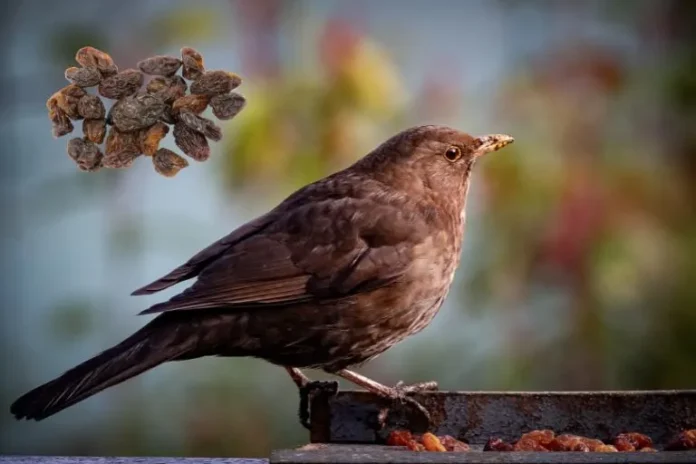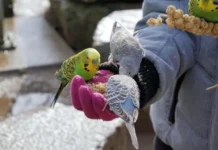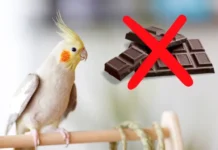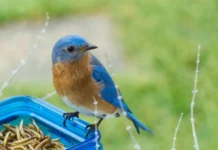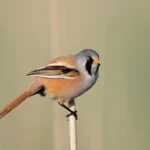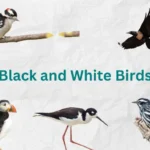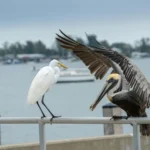Table of Contents
Bird lovers often ask, can birds eat raisins, and about safe foods for their feathered friends. It’s tricky to know which foods are good for wild and pet birds, especially dried fruits like raisins. Choosing the right food is key to keeping birds healthy.
Feeding birds can be fun, but not all human foods are good for them. Dried fruits need special care because of their nutritional value and risks. Bird owners must know how much to give and how to prepare it to keep their birds safe.
Benefits and Risks of Feeding Raisins to Birds
When adding new foods like raisins to a bird’s diet, it’s important to think carefully. Raisins can be good for birds, but we need to be careful and know what we’re doing.
Nutritional Profile of Raisins
Raisins are full of important minerals and vitamins for birds. They have potassium, iron, and a bit of vitamin B and C. These dried fruits can give wild birds a quick energy boost from their natural sugars. This makes them a good treat sometimes.
Potential Health Concerns
Even though raisins are nutritious, they can be harmful to birds. The high sugar can cause obesity and stomach problems in smaller birds. Some birds might have trouble breaking down the sugars in dried fruits.
Serving Guidelines and Moderation
It’s crucial to control how much raisins you give birds. Experts say to only give a tiny bit, like a small pinch. If you’re thinking about giving birds oats, try mixing a few soaked raisins with oats. This can be a good way to add variety to their diet.
But remember, raisins should never be the main food for wild birds. Always check with local wildlife experts or bird scientists for advice on feeding birds in your area.
Can Birds Eat Raisins: Safe Feeding Practices
Understanding safe raisin feeding is key for bird lovers. Can birds eat raisins? Yes, raisins can be a healthy snack for some birds if given right. It’s important to follow bird food safety guidelines closely.
Choose unsulfured raisins without extra sugars or preservatives. Rinse them well to get rid of chemicals. Cut raisins into small bits to stop choking and make them easy for birds to eat.
Where you place the raisins is also important. Use clean feeders for dried fruits to avoid bacteria. Don’t leave raisins out too long, especially when it’s hot. Clean up any leftovers after a few hours to keep things safe and healthy for the birds.
Not all birds like raisins the same way. Watch which birds eat them and how they react. Some, like robins and bluebirds, might enjoy raisins more than others. Always start with a little bit of new food to keep things safe.
It’s also important to keep birds hydrated. Soaking raisins in water can make them tastier and easier to digest. This simple step can make raisins a better choice for backyard birds.
Other Dried Fruits Safe for Wild Birds
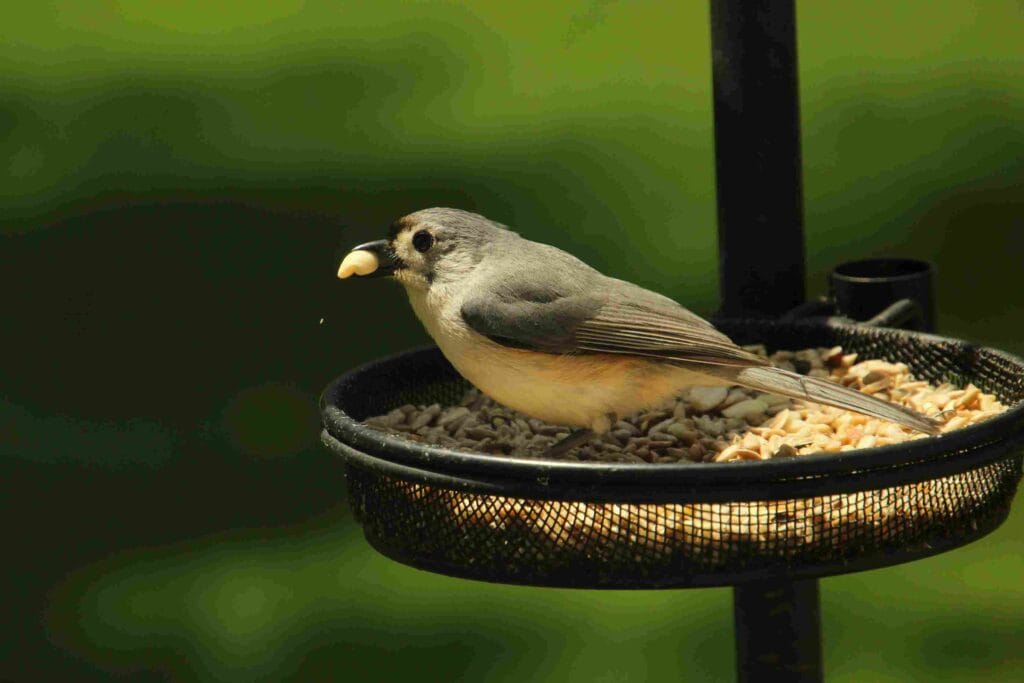
Bird lovers can try different dried fruits to feed their feathered friends. These fruits add important nutrients and are a tasty treat for birds. It’s important to know which dried fruits are safe and good for birds.
Dried Cranberries and Blueberries
Wild birds love dried cranberries and blueberries. These small fruits are full of antioxidants and vitamins. Make sure to give unsweetened, unsulfured dried cranberries. Blueberries are especially good for small birds like finches and sparrows.
Dried Apples and Apricots
Dried apples and apricots are great for birds. They offer natural sugars and minerals. Cut them into small pieces so birds can eat them easily. Fresh bananas, cut into tiny pieces, can also be a treat for birds.
Preparation Methods for Dried Fruit
It’s important to prepare dried fruits right for birds. Choose unsulfured and unsweetened options. Soak them in water for a bit to prevent choking. Cut them into small pieces that fit the birds’ mouths. Start with small amounts and add new foods slowly.
Natural Bird Diet vs Supplemental Foods
Knowing what birds eat in the wild is key to feeding them right. Birds have evolved to eat a variety of foods like insects, seeds, and berries. These foods are full of nutrients they need to survive.
Feeding birds can help them when food is hard to find. Birds look for food in different places and times. But, it’s important not to give them only human food.
It’s all about finding a balance. Bird lovers should try to feed like nature does. Giving different types of seeds, fruits, and supplements can help birds without messing with their natural ways.
Experts say feeding birds should add to their diet, not take from it. Using native plants and the right bird food can keep bird populations healthy. Knowing how birds eat helps us support them better.
Experts suggest changing what you feed and watching how birds react. This way, you make sure the extra food is good for them, not just a replacement for their natural diet.
Alternative Healthy Snacks for Birds
Bird lovers look for healthy snacks for their feathered friends. Knowing the right snacks is key to keeping birds healthy. It also adds nutrients beyond just regular food.
Oats as a Bird-Friendly Grain
Can birds have oats? Yes, they can! Do birds eat oats? Yes, they do! Oats are great for birds because they’re full of protein, fiber, and minerals.
Wild birds and backyard birds can eat rolled or steel-cut oats. These grains help keep birds healthy and strong.
Fresh Fruit Options
Bananas are a great snack for birds. They’re full of potassium and natural sugars. Cut bananas into small pieces for easy eating.
Choose soft, ripe bananas. They’re easier for birds to digest and enjoy.
Seasonal Feeding Strategies
Feeding birds changes with the seasons. In winter, oats help keep birds warm. Springtime needs protein for breeding. Summer needs light, moist snacks.
Start new snacks slowly and watch how birds react. Variety and moderation keep birds healthy and happy.
Best Practices for Feeding Garden Birds
Garden bird feeding needs careful attention and a responsible approach. It starts with knowing how to feed birds right. This means giving them the right food and keeping their environment healthy.
Where you place bird feeders is key. Pick spots that protect birds from predators and let them see clearly. Good places are near shrubs or trees for quick escapes. Make sure feeders are at least 10 feet from windows to avoid bird crashes.
Cleaning bird feeders is crucial. Clean them every two weeks with a mix of nine parts water and one part white vinegar. Rinse well and dry before filling again. This keeps birds healthy and stops diseases.
Offer different foods to attract more birds. Each bird needs something special. Use different feeders for seeds, nectar, and fruits. Change what you offer to keep birds interested and prevent food from going bad.
Don’t forget about water for your birds. Set up shallow birdbaths with gentle slopes and clean them often. Change the water daily to help birds stay hydrated and visit your garden more.
Conclusion
Feeding wild birds needs careful thought and knowledge. It’s not just about giving them food. It’s about understanding what they need and making sure they can eat safely.
Can birds eat raisins? Dried fruits like raisins can be treats if given in small amounts. However, wild birds are best fed foods that match what they find in nature to help preserve their natural eating habits.
People who love birds should do their homework before adding new foods. Watching local birds and learning about their needs is key. This helps create a healthy environment for them.
By choosing the right foods, backyard bird watchers can help local wildlife. Every little bit helps in supporting the birds and the ecosystem around us.
FAQ
Can Birds Eat Raisins?
Not all birds can safely eat raisins. Some birds like sparrows and finches can have a little raisin. But, it’s important to avoid giving raisins to smaller birds or those with sensitive stomachs.
Are raisins safe for all types of birds to eat?
Not all birds can safely eat raisins. Some birds like sparrows and finches can have a little raisin. But, it’s important to avoid giving raisins to smaller birds or those with sensitive stomachs. Always check what birds in your area can eat.
How often can I feed raisins to wild birds?
Raisins should be a rare treat, not a regular food. Only give raisins once or twice a week. Make sure to give them in small, chopped pieces. This helps avoid health problems from too much sugar.
Do I need to prepare raisins before feeding them to birds?
Yes, you need to prepare raisins right. Cut them into small pieces to stop choking. Make sure they’re fresh and not moldy. Soaking them in water can help smaller birds eat them better.

